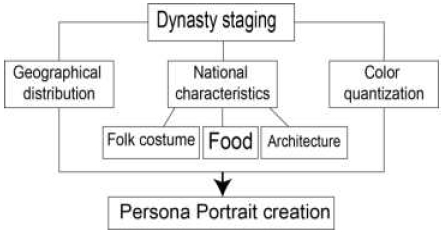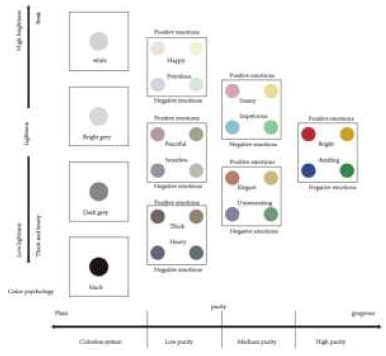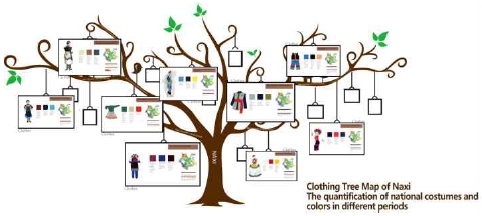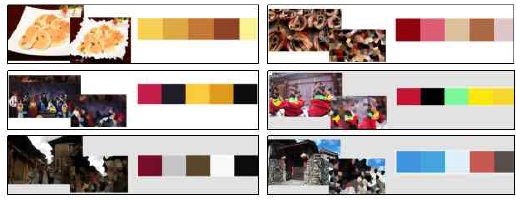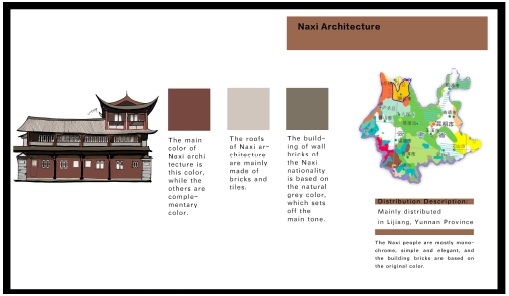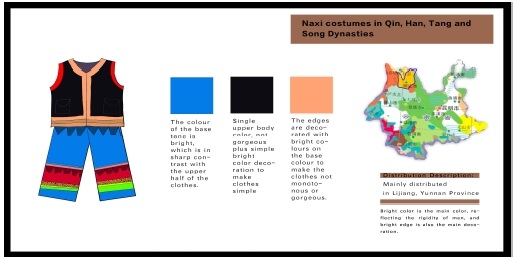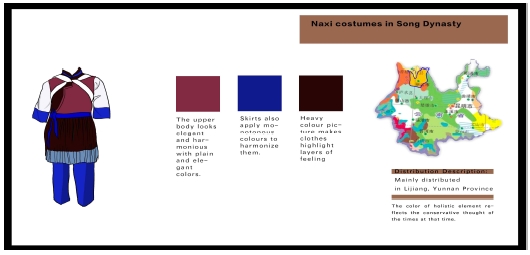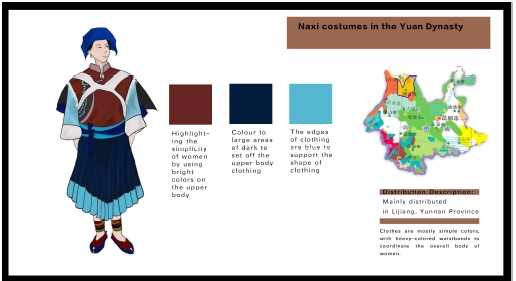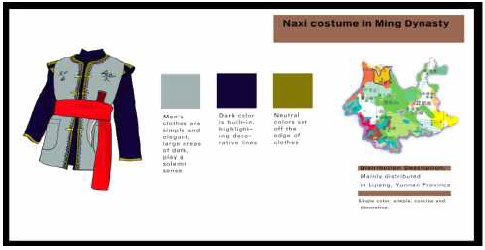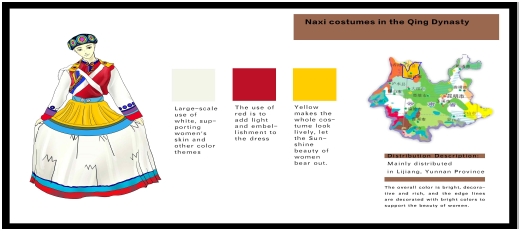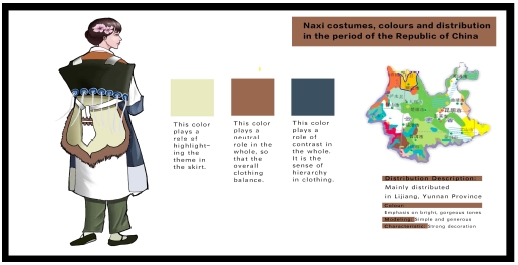
Study on diachronic persona for minority studies : centered on naxi nationality
Copyright ⓒ 2019 The Digital Contents Society
This is an Open Access article distributed under the terms of the Creative Commons Attribution Non-CommercialLicense(http://creativecommons.org/licenses/by-nc/3.0/) which permits unrestricted non-commercial use, distribution, and reproduction in any medium, provided the original work is properly cited.

Abstract
In the modern society of global informatization, it is rare to find frameworks and models for identifying regional culture or minority culture. From the perspective of user experience design, user-centric design is divided into user research itself and user-based research decisions. The persona model is a real user integrated prototype. Characters bring user research to a higher realm and become the most efficient tool for implementing a true user-oriented online business strategy. It is a imperative research concept among the research fields of design. For the original user datas are in huge diversity and it is hard to extract efficient characters, this essay analyzes the connotation of Naxi persona portrait in method of quantified classification while processing the origin of data and demonstrate the construction of Naxi persona portrait in tree diagram user model. Which sets a standard for the study of other ethnic minorities and offers reference of construction method for persona portrait of ethnic minorities.
초록
글로벌 정 보화의 현대 사회에서는 지역문화나 소수민족 문화의 틀과 모형을 식별하기가 매우 어렵다. 경험디자인의 측면에서 볼 때,사용자 중심의 디자인은 사용자 연구를 기본으로 한다. 페르소나는 사용자에게 실질적 도움이 될 수 있도록 종합적인 원형으로 제작된다. 비즈니스 전략에서도 효율적 도구가 되고 있다. 특히 디자인 전 분야에서는 중요한 위치를 차지하고 있다. 본문은 경험디자인 측면에서 사용자의 원시 데이터 기록의 복잡하고 다양하며 효율적인 특징을 추출하기 어려운 문제에 대해나시족 유저 페르소나를 통해 내포된 특징을 해부한다. 유형별 지표의 정량화 방법으로 페르소나의 데이터 출처 및 디자인 처리 과정을 분석한다. 페르소나를 제작하여 그 밖의 다른 소수민족의 페르소나를 구축하는 데에도 영감과 방법을 공유하고자 한다.
Keywords:
Diachronic Persona, Minority, Naxi Nationality, Experience Design키워드:
통시적 페르소나, 소수민족, 나시족, 경험디자인Ⅰ. Introduction
1-1 Main Research Methods
Classified quantification index: constructing persona portrait model design from aspects of geographical distribution, national characteristic, color quantization;
Method for color design: Transferring traditional color methods into modern color schemes;
During the investigation on design process, we found more reliable standards for the development of modeling persona portrait due to modern technique of color management;
Constructing model in tree diagram: tree diagram is the graphical representation of data tree which organize various objects in parent-child hierarchy structure. It is one of the expressions of enumeration methods, which describes relationship in diagram and put units on branches to indicate the interrelationships between each other.
1-2 Design Process of Persona Portrait and Its Construction Methods
Key point of this research is to design a modeling method for characters based on prototypes which cover various aspects under different circumstances in order to get close to a collective character portrait. According to theory of Carl Gustav Jung(1875-1961), the concept of character is as a mask or a social role, it represents the tendency towards social compromise of a person and how his/her social environment regards him/her [1] aiming to conceal one's authenticity [2]. Character portraits are collection of human statements under various scenes or environments. Besides, characters can be built as digital individual models. Thus, according to the development history of Naxi minority, the collected original datas are usually processed for further scene construction and character modelings. Construction method is shown as fig 1.
Main usage of collecting Naxi data is for further scene constructions and character modeling. It requires relevant character datas due to various scenes and character elements.
Specific scene construction requires basic elements from relevant datas, such as dynasty, geographical distribution, relevant people and acticities.
According to cognitive chromatics, color is as the metaphor for people's subjective cognition based on life experiences of the elementary world, of which with the shared culture, knowledge and experience, there forms the common perception on colors. Costume color is a focused concern in our daily life, the research will illustrate design process in quantitative method of chromatics in the following descriptions on Naxi costume.
Color geography was founded by the French industrial designer Lenclos in 1960, which was widely spread and applied in America, Japan and other European regions. Currently, color geography and professor Lenclos' color design method is one of the most prevailing color researches and design methods. American designer Leslie Cabarga uses photochromic RGB and dye colors CMYK as standard color schemes, it collected and explicitly analyzed the color culture and folk psychology from 8 regions of America, Asia, Europe, mid-east, thus giving a standard method in digital image for deeper research on colorgeography and folklore color.[3]
However, the exaction of quantizing color may be sorted in principle from color properties as hue, lightness and purity. Shown as fig 2.
Ⅱ. literature review
2-1 What is a persona?
[USA]SteveMulder/[USA]ZivvYarr,《THE USER IS ALWAYS RIGHT A practical Guide to Greating and using personas for the Web》the book notes that: Persona is an illustration of the real characteristics on target group of the website, as a comprehensive prototype of real users, representing a group of genuine characters.
2-2 Why create a persona?
The benefits of creating personas (focus, resonance, unity, efficiency)
The value of the persona:
1.Persona is the result of researching the target audience depending on user investigations.
2.Personas are the foundation of all subsequent goal-oriented design.
3.Personas accurately express user demands and expectations.
4.Personas are not real characters, but they represent real people in the process of design.
5.A good persona can satisfy everyone and may effectively end the disputes on functions.
Traditional persona portrait is the inference on group of people that are easy to describe, including important factors or behavior properties. Traditional persona portrait emerged in the late 90s, Middleton and relevant researchers[4] studied the method recommended in academic system, using the algorithm modeling principle of LDA Bayes. Group persona portrait is generally to sort people and do market segmentation in method of attribute-oriented induction or similarity calculation. [5] Yanxia Lin and Xiangsheng Xie construct the Weibo group persona portrait in method of LDA modeling, multi-dimensional scaling and multi-logistic regression based on social identity theory.[6]
Modeling method of this essay mainly is in tree diagram, extracting Naxi elements in form of pictures on aspects such as costume, color, food and architectures according to cognitive chromatics, classified quantitative index. Thus processing the modeling character of Naxi in vector-graph. Shown as fig 3.
2-3 Regional culture and ethnic characteristics
According to Chinese historical data, regional cultures mainly include : Jianghuai culture, Hui culture, Qilu culture, Yanzhao culture, Sanqin culture, San jin culture, Chu culture, Bash culture, Heluo culture, Centrual plains culture and other culture; Due to the obstruction of physical geography, cultures in Yunnan region especially minority regions are of strong regional feature. The impact of mutual influence between these regions is an important factor, the creative behaviors of unique groups are also external expressions of their feature. Thus, through basic investigation and organization of datas, this research will do possible regional study and analyze the image design in concept of color theory and modern technique of color management, via quantification of classified index such as geographic distribution, minority characteristics, color quantization to model persona portraits; Then conclude and organize from the minority features such as costumes, color, food and architectures to construct the characters.
These are the persona portrait model design and research below centered on Naxi minority:
Ⅲ. Modeling structure
3-1 Definition of Naxi minority:
Naxi minority is one of the 56 minorities in China, dwelling mostly in Lijiang, northern part of Yunnan as an unique minority, some of them distribute in other regions of Yunnan, also in Yanyuan, Yanbian, Muli counties of Sichuan, a few of them even live in Mangkang county of Tibet.
The Naxi people have their own native language, which belongs to the Tibetan-Burmese language branch of the Sino-Tibetan language family. The Naxi people are unique in art expressions, their poetry, painting, sculpture, music and dance art are famous both in and abroad.
The Naxi kinship organization is commonly existing form in Naxi . It is a minority with a high degree of concentration. Kinship organizations of the Naxi people (Mosuo people) in the Lugu Lake area maintain relatively of their past characteristics, but also the Naxi culture is deeply influenced by the Han culture.
During Spring and Autumn period, Naxi people started to move from Yellow River basin to south and end up around the Jinsha River and Yabijiang basin since Qin dynasty. Before the establishment of new China, it had many old names such as Nari, Naxi, Naheng and Nahan, after 1954, the name Naxi minority was approved by the State Council officially.
3-2 Existing Pre-research on Color Geography in China:
Since color is closely related to human daily life, the study of color is an important field in understanding the world. People's understanding of color can not only reflect the cultural characteristics of cultural regions (groups), but also build up the new characteristics of this cultural regions (groups). Thus often as a one of the symbols to distinguish various cultural region (groups) and has become an entrance for researching the natural and humanistic characteristics of cultural regions (groups), which is also one of the conditions for successful cultural exchanges, commodity circulation, and information transmission.[7]
So far, the research on color geography is mainly in field of urban color research, color application in architectural design, tourism image design and landscape planning in tourism development. In this essay, the characteristics of color geography are used to extract colors from the garment, architecture and food of Naxi people.
In summary of the four characteristics: the geographical distribution of the Naxi people, the Naxi costumes, the Naxi food, the Naxi architecture, plus the color quantization in the color induction of Naxi, forming the modeling of persona of Naxi minority based on dynasty stages. The following is the detailed modeling of personas of each dynasty, mainly based on design of the vector.
3-3 Quantized Color Extraction on Naxi minority
Color plays an important role in Naxi culture, it is not only fully applied and developed in their production and living, but also being treated as symbols and aesthetic objects, [8] But in relevant researches, illustration on relationship between color and folklore is rare. This essay may study the transformation from folk color styling into modern color designs via three color attributes and folk color quantization Shown as fig 4.
3-4 Concrete Features of Naxi Minority
Naxi minority is one of the 56 minorities in China, dwelling mostly in Lijiang, northern part of Yunnan as an unique minority, some of them distribute in other regions of Yunnan, also in Yanyuan, Yanbian, Muli counties of Sichuan, a few of them even live in Mangkang county of Tibet.
The most evident feature of Naxi costume is “ always under the Stars and Moons” , it illustrates the industriousness and virtue of Naxi women. Dwelling in many counties of Yunnan and Sichuan province, the characteristics of Naxi costumes are integrally related with their daily life, psychical environment and agricultural activity, forming an important part of Naxi culture. Besides, Naxi costumes are considered “heavy” which is influenced by the natural environment and local climate. Looking from the historical data, Naxi people started to live near Yapan River and Jinsha River before Qin dynasty, in which climate is typical Hengduan mountains climate with obvious temperature difference between day and night and shapes the Naxi costumes into thickness and heaviness[9], thus Naxi consume shall be representative while designing the model of Naxi portrait.
Naxi minority mainly lives around Hengduan mountains regions in Lijiang, Yunnan, where the climate is hugely diverse and of various weathers even within ten miles distance, as the artery between Yunnan, Sichuan and Tibet, hybrid food flavors of all these provinces has generated Naxi people ever since, forming its unique food culture with exotic features. Also, Naxi food is deeply related with festivals and ritual activities. We extract famous local food Lijiang Stuffed Bun and Eight Bowls for reference in constructing the designs. Shown as fig 5.
The famous historical city in China — Lijiang old city has reflected its great architecture work in diversity, which has becoming marvellous wonder in Chinese architecture history. Appearance features of naxi dwellings: the outer wall is not built to the top, the upper part of the back wall is separated by the timber board, and the gables at both ends are separated by the top and the peak by the "sparrow table", the peaches hanging from the eaves appear very deep. Fish carvings hang from the eaves, the walls lean in from below, and the roof stretches softly. Make the structure of the house light and elegant. The model design is carried out with the "horse racing turret" as examples, Shown as fig 6.
As above, four characteristics as geographical distribution, costumes, food and architecture, plus extraction on quantized color in color theory form the dynasty-based persona portrait of Naxi people.
Ⅳ. Case study
4-1 Quantitative Index by Classification
In quantitative index by classification, basic information and main characteristics of persona portraits can be designed as Table 1 and Table 2.
4-2 Persona Portrait Design Based on Historical Period
Interpreting from main development phases of Naxi minority, there are nine representative phases, Applying the method of quantified color extraction in sections 1.2 and 3.3, and the method of quantified classification of indicators in section 4.1. We will process detailed analysis and portrait design according to the nine phases below:
The geographical distribution of Naxi people in the Qin, Han, Tang and Song Dynasties, according to historical records, is mainly distributed in the southwestern part of Liangshan Yi Autonomous Prefecture of Sichuan Province in China, Yanbian County, Ya'an District and Ganzi Tibetan Autonomous Prefecture of Panzhihua City. The south, as well as the northwestern part of Yunnan Province.
During Qin period, ancestors of Naxi people lived in southwest part of current Yi minority region in Liangshan, Sichuan, Yanbian county of Panzhihua City, Yaan region, southern part of Garze Tibetan autonomous prefecture and northwest Yunnan.
As long as they were nomads that often migrated, they wore much feather made materials on daily garment which were efficiency and practicality oriented. Shown as Fig. 7 Qin, Han, Tang, Song Period.
In Song Dynasty, the Naxi area was under the jurisdiction of the Dali State. The Naxi tribes each occupied an influenced developing region. The Dali Kingdom could not effectively control the Naxi area. Tubo in the north had frequent internal disturbances and was unable to go south. The Naxi region is in a relatively stable environment, thus bringing about the development of population, economy and culture.
In Song dynasty, it continued the feather fur style garment in Tang Song, while processing technic developed and influenced the promotion of garment style, more binding element was added as fig 8 showed.
In 1285 (to the 22nd year of the Yuan Dynasty), the "Lijiang Military and People's Xuanfu Division" was changed. The Xuanfu Division was inherited by the descendants of Mai Liang, and unified the tribes of the Naxi area of the "Emirates Stars", officially incorporated into the administrative district of Yunan province.
With the development of economy and the progress of light industries, the life style of Naxi people shifted from nomad to farming, even more craftsman from inland started to participate trading and the governors paid great attention to introduce Han culture in the mean time. shown as fig 9.
Chieftain Mu of Lijiang actively introduced the production technology and cultural education from the Han area of the Central Plains, recruited talents and vigorously developed the local economy. Litang, Kangding and the south of Changdu, Tibet. Mu had also migrated a large number of Naxi people to the mentioned areas, so the distribution of the Naxi people also included these areas.
Chieftain Mu of Lijiang had actively bring Han technique and education to Yunnan and hugely developed local economy, he set up war to Tibet since 1462 and spread his territory till Muli, Batang, Kangding and southern part of Changdu, Tibet. He moved many Naxi people to these places as guardians, so that these people later settled themselves in Tibet. Costumes at that time often described as “daggers on waist, mat under knees, full seasons woolen coat”, as shown on fig 10.
Qing took Manhan lifestyle and ethnic of Confucian culture to evaluated the folk culture of Naxi people, imperatively operated social tradition shape shifting on Naxi regions, such as abolishing cremation and renovating costumes, adding sleeves and coattail for the top, making it a coat with shorter front and longer back, then breaking the long dress into two pieces, only one piece of loincloth remained. This kind of garment lost its original elegance but only efficient for daily labors. [10] as shown on fig 11.
With the development of society, costume is often as one of the targets with social revolution, during the Revolution of 1911, Naxi costume had total shift and turned to Han style, but for the geographical limitation, the weather is cold both early morning and night in Lijiang highland, sheepskin waistcoat remained. Since then, seven stars waistcoat has always been the most remarkable feature of Naxi costume.
In 1961, Lijiang Naxi Autonomous County was established in Yunnan Province.
In December 1997, the ancient city of Lijiang was awarded the “World Cultural Heritage” by UNESCO.
In June 2003, Sanjiang River was named "World Natural Heritage". In September, the Naxi Dongba ancient books were selected as "World Memory Heritage List".
On July 6, 2011, the Lijiang Ancient City Scenic Spot was assessed as a national 5A-level tourist scenic spot by the National Tourism Administration, as shown on fig 12.
Ⅴ. Conclusion
The necessity of the study of persona:
From the perspective of user experience design, user-centric design is divided into user research itself and user-based research decisions. The persona model is a real user integrated prototype. It describes a target group, which can define features and functional scopes for upgrading service to different types of users. Characters bring user research to a higher realm and become the most efficient tool for implementing a true user-oriented online business strategy. It is a imperative research concept among the research fields of design. (Modified according to the 1st comment of Judges 3) Among the other ethnic minorities in China, for the Naxi people have relatively distinctive historical and cultural characteristics, thus this article establishes the persona based on Naxi people:
This essay quantities the classification index of persona portrait on Naxi minority and processes model design from aspects of distribution, properties and color quantization; Based on dynasty , the essay extracts basic properties (Geographical distribution, color quantization) and typical properties ( costumes, food, architectures) and designs the construction method for persona portrait of Naxi people, of which can explicitly conclude the development history of Naxi minority and offer an profiling method for other minorities.
Despite as the bases in the foundation, personas still have their shortcomings:
1) Creating useful role is difficult and time consuming;
2) Personas are representatives of different user groups, so more attention is paid on the differences between groups, and it is difficult for a general user to fully comply with the complete description of a certain role;
3) Characters that are too complicated or too many are hard to remember.
The construction method in this research is still relatively limited for its only dynasty-based, it does not go deeper into Naxi culture such as Dongba Culture of Naxi, the relationship between folklore and its color etc, future research may go further in analyzing the details of these features and introduce more specific persona portrait with user experience, combining method with better UI interface design while encouraging more pervasive research.
Acknowledgments
This study was completed with the support of TED studio of kookmin university of South Korea. I would like to thank my supervisor, professor Young Hwan,Pan, for his dedicated guidance on the topic selection, the structure of the paper, and the later adjustment. I would also like to thank my classmates who helped me, such as zheng ling and zhang yi.
Reference
- Jung, C.G., Adler, G., Hull, R., C. G. Jung Collected works of, volume 6, Psychological types, Princeton University Press, Princeton, NJ, USA, 6, (2014).
-
LaLlave, J.A., Gutheil, T.G., Expert witness and Jungian archetypes, Int.J.Law.Psychiatr, 35, p456-463, (2012).
[https://doi.org/10.1016/j.ijlp.2012.09.012]

- Feifei Wu Translated by, Baoquan Tan, Leslie Cabarga, The Designer's Guide to Global Color Combinations, Shanghai, Shanghai People’s Fine Arts Publishing House, p10-11, (2003).
- Yanxia Lin, Xiangsheng Xie, User Portraits of Weibo basis on social identity theory【J】, Information Studies:Theory & Application, 41, p142-148, March), (2018.
- Yicheng Wong, Ping Wong, Research on Modeling Scientific and Technical Information Services Based on Dynamic User Portraits, Information Studies:Theory &Application, 42, p83-88, April), (2019.
- Bin Lei, Zhigang Chang, Zhen Zhong, Research on Group User Portraits Based on Orders of Online Stores, Journal of Henan University of Technology(Social Science Edition), 15, p52-59, January), (2019.
- Yuanfang Wu, Geographical Perspective of Color Culture[J], Fujian Geography, 20, p28-32, March), (2005.
- Gengsheng Bai, Color and Naxi Nationality, Social Science Academic Press, p10, April), (2001.
- Youfen Ho, On Evolution of Naxi Clothing, Yunnan Archives, p28-30, June), (2013.
- Guo Ao, Ma Jianhua, Archetype-Based Modeling of Persona for Comprehensive Personality Computing from Personal Big Data.[J], Sensors (Basel, Switzerland), February), (2018.
저자소개

2002년 : 산동공예미술대학 (학사)
2010년 : 제로공업대학 (공학석사)
2017년:국민대학교 테크노디자인전문대학원 (박사)
2003년~2016년: 산둥상업직업기술대학
2017년~현 재: 쿤밍이공대학
※관심분야: 스마트경험디자인학과, 인터랙션디자인 랩, 정보보호(Personal Information), 디자인학 랩.

1991년 : 한국과학기술원 (전기전자공학 학사)
1993년 : 한국과학기술원 (인간공학 석사)
1999년: 한국과학기술원 (인간공학 박사)
2006.9 ~ 현재 국민대학교 테크노디자인전문대학원 대학원 부원장 전담교수
2013.1 ~ 현재 국내 사용자경험전문가협회 회장
삼성전자 DTV UX 책임 연구원
삼성전자 전사 사용성 인증 위원
팬택&큐리텔 UI 팀장 및 팬택 계열 해외 UI 팀장
인터랙션디자인랩 전담교수
중국 칭화대 방문교수
사단법인 대한사용자경험전문가협회 협회장
사단법인 한국서비스디자인학회 학회장
